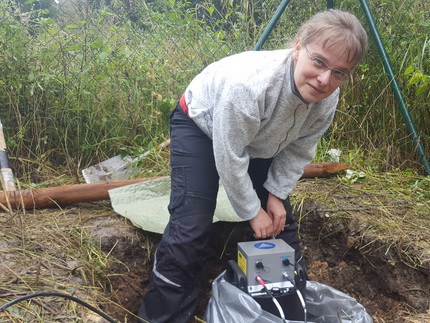Dr. Stefanie Donner - BGR
Where do you work and what is your job?
I work as a seismologist at the Federal Institute for Geosciences and Natural Resources Hannover (BGR) in the department "Federal Earthquake Service / Nuclear Weapons Test Ban". The BGR is a departmental research institution subordinated to the BMWK and partly now also to the BMU. In addition to my research on earthquake source processes and rotational seismology, I am an evaluator for the Federal Earthquake Service and at the same time head of the working area "Monitoring and Verification".
What were your previous professional stations?
After studying geosciences with a diploma in geophysics at the University of Potsdam, I also completed my PhD here in 2013. The topic of my PhD thesis was "Seismotectonic implications for the Alborz mountains, Iran, from regional moment tensors". After that, I moved to LMU Munich and did research in the ROMY project mainly on how and with which added value measurements of rotational ground motions can be integrated into the waveform inversion after the seismic moment tensor. At LMU I also started my habilitation in 2015, which I then completed in 2020 from BGR.
How did you get your current job?
Actually, I had just started to prepare a research proposal to finance my further career. Also, an application for a junior professorship was still in progress when the BGR advertised a position for a seismologist. For me, this was the more attractive option and I am very happy that I could prevail among the really very good competitors for this position.
What attracted you to the job?
On the one hand, my own research interests coincide well with the tasks and goals of the BGR. This means that I can continue to pursue my interests without having to fulfill the ever-increasing, time-consuming (self-)administrative duties of a professorship. In addition, departmental research takes place in a very interesting quadrangle of tension between research, politics/economy, the public and industry. The main task is to apply the latest research findings in a very targeted manner to answer socially relevant questions. More and more often, conflicts of different interests arise in the process. In such cases, suitable compromises must be found to ensure that all interests are taken into account as effectively as possible. This is where departmental research plays an important advisory role.
And, yes! The security of a permanent position was definitely another incentive that should not be neglected. The justified displeasure about the increasingly precarious working conditions of young scientists is growing; myself included. This is also clearly reflected in the hashtag #IchbinHanna in the social media.
What are the most important skills to have for this job?
In principle, the same skills and abilities that you need as a scientist in the academic world. In addition, there is a certain feeling for socially relevant topics (and the associated potential for conflict) as well as the ability to present complicated issues in a simple but not oversimplified manner and a certain minimum of diplomatic skills. Structural thinking, management skills and sometimes a well-trained resilience (a "thick skin") are also very useful.
What does a typical work week look like for you?
Most of the work takes place on the computer, whether it is scientific or advisory/coordinating work. Communication at different levels and to a wide variety of stakeholders takes up a lot of the time. Otherwise, my work looks pretty much the same as for a seismologist at a university or research institution, including writing grant proposals and field work now and then.
What do you like about your job and what challenges you the most?
As I said, I find the quadrangle of tension between research, politics/business, the public and industry very appealing. I have the impression that I am now working more than before for the future of our society and definitely have influence to positively influence and help shape things. At the same time, that is also precisely the challenging part of my work. Things get political very quickly, and social networks in particular can quickly turn a misunderstanding into a shitstorm that you can't easily catch. Precise, addressee-oriented communication is enormously important; strict hierarchical responsibilities in an authority are helpful.
How much of the knowledge you learned in your studies do you need in your job?
Since I still work mainly as a scientist: everything.
Looking back, how do you feel about your geoscience studies at the University of Potsdam?
The time I spent studying was neither easy nor carefree for me, which has a lot to do with my personal background. The fact that I am a working-class child is only one aspect of this. Putting this aside, the time I spent studying for my degree and doctorate at the University of Potsdam was incredibly exciting, educational (beyond the subject matter), and also very enjoyable. I experienced a lot of support, met many inspiring and great people, and discovered interesting places. The field trips and, during the PhD period, the conferences were always a highlight. Studying in Potsdam was one of my best decisions so far.
Do you have any tips for our graduates for a successful career start?
Be courageous and have self-confidence. Know your strengths (not only professional), but also your own limits and conditions. Follow your interests. Don't let anyone tell you that you have to change in order to be successful. Success is what you define for yourself.

